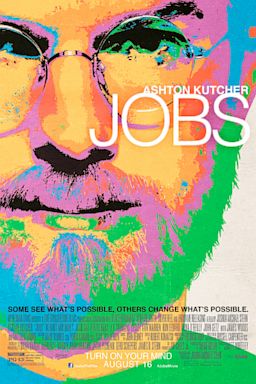Jobs
 Jobs Directed by: Joshua Michael Stern Cast: Ashton Kutcher, Josh Gad, Dermot Mulroney, J.K. Simmons, Matthew Modine Running Time: 2 hrs 7 mins Rating: R Release Date: August 16, 2013
Jobs Directed by: Joshua Michael Stern Cast: Ashton Kutcher, Josh Gad, Dermot Mulroney, J.K. Simmons, Matthew Modine Running Time: 2 hrs 7 mins Rating: R Release Date: August 16, 2013
PLOT: The story of Apple Computers guru Steve Jobs (Kutcher), as he grows from Atari-employed hippie to the leader of a billion dollar company.
WHO'S IT FOR? Those curious about the story of Steve Jobs; giving Kutcher a fair shot is necessary as well.
OVERALL
Kutcher's choice to play Steve Jobs is an admirable one, and for the most part he can take it as a success. The actor's take on Jobs is a full physical embodiment, hunching his shoulders as he shuffles with a basically constipated walk. As he addresses his listeners in numerous intriguing scenes of behind-the-scenes pontificating, he talks like a guru, speaking clearly, slowly, and gently. Kutcher's bone structure on his face, more often associated with his societally accepted good looks, is even put to work here to show a tension within him, more than just clenching his teeth with his mouth closed. Kutcher's face naturally even kinda looks like Jobs, especially when he is shown as 2001 Jobs in a wide shot in the film's beginning.
The casting of a former teen idol like Kutcher even works for the benefit of Jobs' more juvenile moments. Instead of hindering them, the sometimes distracting casting of Kutcher (his previous Kutcher-ness doesn't fully disappear, but dammit it if he doesn't try to make this so) services this competitive characteristic of Jobs, instead of making a complete joke out of it. In the only Social Network comparison I am going to make in this review, this role works like Timberlake did for Sean Parker, a role that benefited from his casting and baggage.
As Jobs' friend and co-founder Steve Wozniak, Josh Gad uses the role as an intriguing showcase of mixing comic relief with brokenhearted drama. Gad provides strong servings of both without making the either feel forced upon the audience, contributing a comfortable amount of believability that Gad's version of Wozniak is not entirely "written" to serve a simpler point of entertainment.
Jobs maintains its striking acting quality with a strong supporting cast, utilizing actors who we may only see in bit parts, but can nonetheless serve when brought into the right script. Dermot Mulroney, J.K. Simmons, and Matthew Modine make for some of the movie's finest confrontations, especially when the course of events leave Jobs having to battle board room doubt, despite the success he has already achieved by his defining motivation. By focusing on these conference room moments, these well-performed scenes provide its story with all of the character for its title icon that it needs.
Though it has a bumpy start of slow motion walking and weird insert shots, Jobs soon levels out above average ground with a constant grasp on the excitement of this story. Its course of events play against any type of expectations one may initially have about the success of a now-unanimously adored innovator, and take the audience on a tour of Jobs' frustrations as he tries to get people to understand the value of his risks. "They're not seeing the big picture," he says.
With the attention that is given to moments of Jobs winning people over with his ideas, Jobs is certainly an ideological advertisement for its company, but it doesn't ring like a commercial such as this summer's The Internship. With respectable tact Jobs even keeps the whole Pirates of Silicon Valley conflict at bay, not investing more than one volcanic reaction from Kutcher's Jobs on the whole Mac v. Windows issue. If anything, it could leave a viewer unfamiliar with this saga (or indeed, Pirates of Silicon Valley) yearning for more, after having teased what would become a huge rivalry.
Without spoiling the movie's cut-off point, Jobs boasts one of the more perfect conclusions to be seen this summer, ending at the best moment in which Jobs' narrative can be filled in by our own experiences with his products. It is similarly a strong testament to this movie's goal to not tell the sole story of an innovator, but about one who even claimed himself that he doesn't work well with other people, whose ultimate goal was to work alone.
While the film is told with commendable dramatic control, sans a few weird directorial choices by director Joshua Michael Stern (some unfortunate insert shorts), its score proves to be the film's biggest weakness. Providing a goofy whimsy of magic to the unveiling of certain technology, it tightly squeezes the viewer's hand through certain emotional checkpoints. These are orchestral arrangements more immediately associated with slow motion catches in sports movies than they are the presentation of a new computer.
A concise prologue of the behind-the-scenes events that led to the complete wreckage of my attention span, Jobs is a strong example of what a biopic should be. It should provide its obvious exposition with narrative tact, convincing the audience they are watching more than just a collection of sound byte events. And most of all, a biopic shouldn't just concern itself solely with the events of a single person's life, but the malleable characteristics that gave this figure their importance, while seeing the big picture Jobs (apparently) always was looking towards. This is not just a recollection of a man's life, it's about the struggle for an original creator to maintain his vision; Jobs' genius is not that he was so smart, but that he was so motivated to prove non-believers wrong.
FINAL SCORE: 7/10